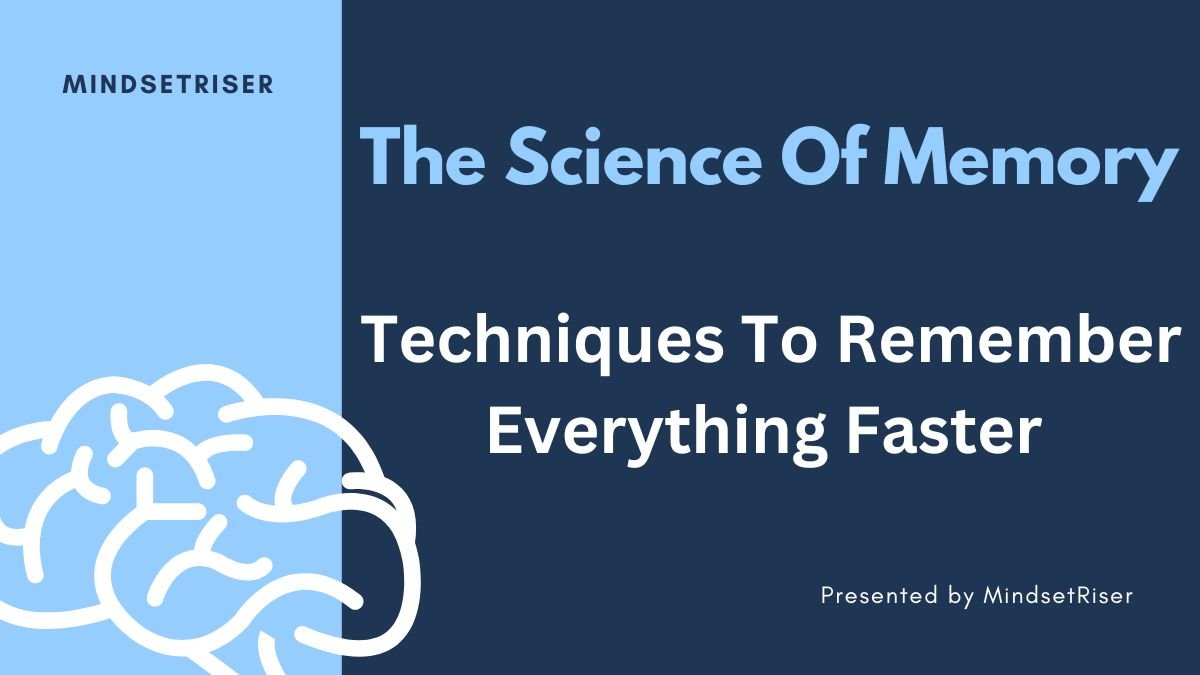The Science of Memory: Techniques to Remember Anything Better
Introduction
Do you struggle to remember names, dates, or important information? You’re not alone. Memory is an essential cognitive function, yet many of us find it challenging to retain and recall information effectively.
The good news? Science-backed memory techniques can help you remember faster, longer, and with greater accuracy. In this guide, we’ll explore how memory works, why we forget things, and proven techniques to boost your memory power.
Understanding How Memory Works
Before diving into the techniques, it’s important to understand how memory functions. Memory operates in three stages:
1. Encoding (Taking in Information)
When you learn something new, your brain processes the information and stores it as a memory trace. The stronger the encoding process, the easier it is to recall the information later.
How to Improve Encoding:
- Pay full attention when learning something new.
- Use multiple senses (visual, auditory, kinesthetic) to reinforce the information.
- Relate the new information to something you already know.
2. Storage (Retaining Information)
Memories are stored in different brain regions, primarily in the hippocampus and neocortex. Stronger neural connections lead to long-term memory retention.
How to Improve Storage:
- Use spaced repetition (review information at intervals).
- Sleep well—deep sleep strengthens memory consolidation.
- Organize information logically to aid storage.
3. Retrieval (Recalling Information)
Retrieving memories is the process of pulling stored information into conscious awareness. The more you practice recalling information, the stronger the memory becomes.
How to Improve Retrieval:
- Test yourself regularly (active recall).
- Use mnemonics or memory aids.
- Teach the information to someone else.
Why Do We Forget Things?
Forgetting is a natural process, but understanding the reasons can help prevent it.
🧠 Common Reasons for Forgetting:
- Lack of Attention: Distractions make encoding ineffective.
- Decay Theory: If a memory isn’t used, it weakens over time.
- Interference: New information can overwrite old memories.
- Stress & Anxiety: High stress reduces focus and memory retrieval.
🔹 Fix It: By applying strategic memory techniques, you can prevent forgetfulness and boost retention.
Best Memory Techniques to Remember Anything Better
1. The Spaced Repetition System (SRS)
Why It Works: Instead of cramming information in one sitting, review it over time. Each review strengthens neural connections, making recall easier.
✅ How to Use It:
- Learn new information → Review it after 1 day, 3 days, 1 week, and 1 month.
- Use flashcards (Anki, Quizlet) to practice recall.
- Review difficult concepts more frequently than easier ones.
📌 Example: If learning a new language, review new vocabulary at increasing intervals.
2. The Memory Palace (Method of Loci)
Why It Works: This technique uses spatial memory to associate information with specific locations, making it easier to recall.
✅ How to Use It:
- Imagine a familiar place (your home, office, or a route you walk daily).
- Place pieces of information in specific locations.
- When recalling, mentally walk through the location to retrieve the data.
📌 Example: Remember a grocery list by visualizing items placed in different rooms in your house.
3. Chunking (Breaking Down Information)
Why It Works: Our brain remembers small groups of data better than long sequences.
✅ How to Use It:
- Break down long numbers, words, or concepts into smaller, meaningful groups.
- Relate chunks to familiar patterns.
📌 Example:
- Instead of remembering “3847592168”, chunk it as “384-759-2168” (like a phone number).
- For memorizing a list of words, group them into categories.
4. Mnemonics & Acronyms
Why It Works: Mnemonics create memorable associations with information.
✅ How to Use It:
- Use acronyms (e.g., PEMDAS for math: Parentheses, Exponents, Multiplication, Division, Addition, Subtraction).
- Create rhymes or songs to encode information.
- Use imagery—turn abstract information into a vivid mental picture.
📌 Example:
- To remember the Great Lakes: HOMES (Huron, Ontario, Michigan, Erie, Superior).
- To recall the planets: My Very Educated Mother Just Served Us Nachos (Mercury, Venus, Earth, Mars, Jupiter, Saturn, Uranus, Neptune).
5. Active Recall (Self-Testing)
Why It Works: Actively retrieving information strengthens memory and improves long-term retention.
✅ How to Use It:
- Instead of re-reading, close the book and recall what you learned.
- Write summaries without looking at notes.
- Use flashcards with questions on one side and answers on the other.
📌 Example: If studying history, try recalling key events before checking your notes.
6. The Feynman Technique (Learn by Teaching)
Why It Works: Teaching forces you to simplify complex concepts, making them easier to remember.
✅ How to Use It:
- Pick a topic and explain it in the simplest way possible.
- Identify gaps in your knowledge and refine your explanation.
- Use analogies to relate concepts to everyday situations.
📌 Example: Explain how photosynthesis works as if you were teaching a 5-year-old.
7. Sleep & Nutrition for Better Memory
Why It Works: Sleep consolidates memories, and the right diet improves brain function.
✅ Tips for Better Memory Health:
- Sleep 7-9 hours every night.
- Eat brain-boosting foods: blueberries, nuts, fish, dark chocolate, and leafy greens.
- Stay hydrated—dehydration affects cognitive function.
📌 Example: Have a handful of walnuts and green tea before studying.
Conclusion
Memory is not just a natural talent—it’s a skill that can be trained and improved. By using spaced repetition, visualization techniques, mnemonics, and active recall, you can enhance your memory retention and recall ability.
Start applying just one or two of these techniques today, and over time, you’ll notice a significant boost in your ability to remember and recall information effortlessly.
Key Takeaways
✅ Memory works in three stages: Encoding, Storage, and Retrieval.
✅ Common reasons for forgetting include distraction, lack of repetition, and interference.
✅ Effective memory techniques include Spaced Repetition, Memory Palaces, Chunking, Mnemonics, Active Recall, and Teaching.
✅ Lifestyle factors like sleep, nutrition, and stress management play a crucial role in memory enhancement.

